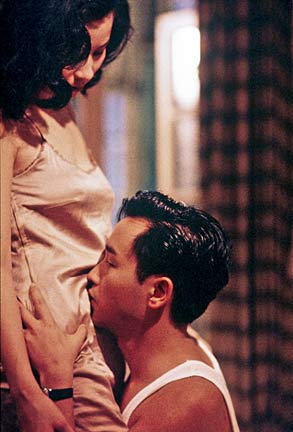
|
Wild love
History is kind to an Asian film
that flopped at its 1991 premiere
It's hard to believe nowadays, considering Wong Kar-Wai's stature as an internationally acclaimed filmmaker, that his now-heralded "Days of Being Wild" was a box-office failure in its native Hong Kong back in 1991.
"Days of Being Wild"
Not Rated
Playing at 1 and 7:30 p.m. tomorrow, Sunday and March 29; 4 p.m. tomorrow and Sunday; 7:30 p.m. March 28; and 1 p.m. March 30 at the Doris Duke Theatre, Honolulu Academy of Arts
|
Even though the film had all the makings of a potboiler of a romantic drama -- with its characters coping, in their own ways, with the vicissitudes of love with one another -- Wong kept the melodrama at arm's length, letting the characters' stories play out in an unhurried and elliptical way.
"Days of Being Wild" also marked Wong's first collaboration with cinematographer Christopher Doyle, who made his reputation with this film.
The two men created a muted palette of color for this film, generally using static and deep focus shots, with the occasional high angle camera placement. Only once does the camerawork bring attention to itself, and that's with a long-tracking Steadicam shot that anticipates the film's only act of violence.
The intertwined lives and desires of an amoral ladies' man, his well-off ex-call girl of a caretaker, his self-doubting friend, a quiet and lonely shopgirl from Macao, a brash and driven club dancer, and a befriended night policemen are handled with grace and certainty by Wong, who already shows here at this early stage in his career a sensitivity in his choice of soundtrack music.

Yuddy and Mimi (Carina Lau) share an intimate moment.
Wong gets the best out of his cast. Leslie Cheung, once dubbed "the Elvis Presley of Hong Kong," uses his smoldering good looks to mask his character's emotional abuse. Maggie Cheung, as the resilient shopgirl, has one fine scene as she confesses to Lau's policeman character her quiet desperation.
And actresses Carina Lau and Tita Mu–oz deserve special mention for their respective portrayals of the dancer and the caretaker.
"In the beginning, I wanted to tell a story about love in those early years," Wong said of his film, "how love was a many calamitous thing and that there was no cure for those infected. Time may heal wounds but there is no way to mend a broken heart."
For one of his characters, it means death. But with the film's final scene, the memory and romance of that person lives on to the life-affirming pulse of a rumba.
[News] [Business] [Features] [Sports] [Editorial] [Do It Electric!]
[Classified Ads] [Search] [Subscribe] [Info] [Letter to Editor]
[Feedback]

